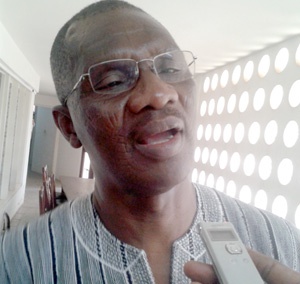Dr. Abdulai B. Salifu, Director General of the Council for Scientific and Industrial Research (CSIR) has bemoaned the practice where rice farms were being taken away for residential and oil businesses, and said this had the tendency to thwart the countrys efforts of meeting its rice demands.
He indicated that some pieces of land along the Nyankpala road that were previously being used to cultivate rice in large quantities, were being taken away by filling station businesses, and blamed state institutions such as the Town and Country Planning and the Environmental Protection Agency (EPA) for being complicit.
Dr. Salifu expressed the concern in Tamale on Wednesday during the launch of the quality rice development project being funded by Alliance for Green Revolution (AGRA) and implemented by CSIR-SARI with TRIAS Ghana and AMSIG Resource as partners.
Launching the three-year project, the Director General said his outfit had made frantic efforts to stop such practices but in the process realized that the Town and Country Planning Department was complicit in releasing such lands, instead of being used for rice cultivation.
He expressed regret that state institutions that were supposed to safe-guard the country, were rather engaged in illegalities to the neglect of the total good, noting that Ghanaians stood to lose a lot with such negligence.
Dr. Salifu said the CSIR had over the years conducted cutting-edge research and extended the frontiers through applied research, field studies to generate technologies for increased productivity and extended the technologies to end-users.
He said it was reassuring that government was focused on partnering with the private sector, to eliminate constraints to tackle challenges in the agricultural sector, noting that 1,200 hectares of land had been added to the stock of irrigable lands for rice production.
Dr. Salifu said another 8,000 hectares have been added by the private sector to supplement 6,000 hectares in the three northern regions, stressing that 15,200 hectares of total land had been devoted to rice cultivation in the country.
He observed that if the country continued in such progress, it would become a net exporter of rice and that the national rice development strategy, sustainable development of rain-fed lowland rice production, rice sector support project and the inland valley rice development projects, were but few of the projects that would enhance growth in the sector.
Agriculture-led development is fundamental to reducing hunger and poverty, generating economic growth, employment, reducing the burden of food imports and opening the way to an expansion of export, he added.
Dr. Stephen K. Nutsugah, Director of SARI, said the project reaffirmed the vision of the organization to making agricultural research responsive to farmer needs and national development, to maximize synergy to improve livelihoods of smallholder farmers.
He said among some of the objectives of the project was to strengthen institutional and organizational capacities of Farmer-Based Organizations, to improve access to services and marketing of locally produced rice.
Mr. Samuel Sey, Programme Officer for Farmer Organization Support Centre in Africa (FOSCA), expressed worry that poverty was most severe among food crop farmers in the country, and urged government to initiate policies to assist them.
He said small-scale farmers who dominated the local rice industry lacked access to premium varieties that were demanded by the market forces noting that traditional farming practices must give way to modern farming practices for desired results.
Click to view details



Business News of Thursday, 3 April 2014
Source: GNA

















